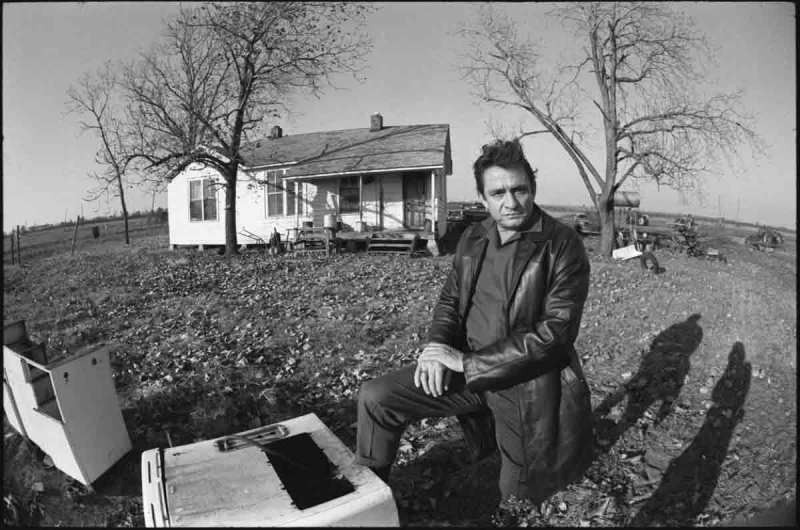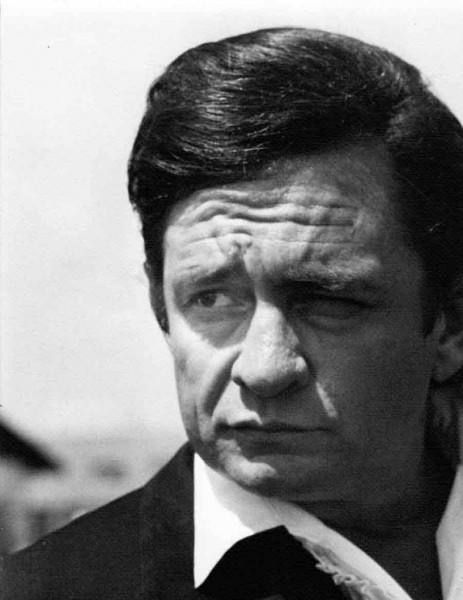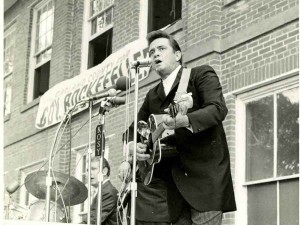In the 1990s, amid the thriving alternative music scene, Cash’s music reached a new generation of fans raised on punk and rap music. His comeback had an unlikely source in Rick Rubin, an L.A.-based record producer best known for working with heavy metal bands and hip hop artists. Rubin had Cash fly to L.A. for a series of recording sessions. The first album from those sessions was released in 1994 on the American Recordings label. To date, Rubin has released six albums from his sessions with Cash. The last of the American Recordings albums featured an image of Cash taken in Dyess in 1944.
Amid his comeback, Cash still found time for Arkansas. In late March 1994, a few weeks before the release of his landmark album American Recordings, Cash visited his birthplace- to "touch my roots again," as he put it. Cash dedicated a new post office in Kingsland, which was featuring a new Cash cancellation stamp. Governor Jim Guy Tucker named it "Johnny Cash Day," and among the activities was a Johnny Cash sing-a-like content. Cash also preformed songs with his wife. In December 1996, Bill Clinton honored fellow Arkansan Johnny Cash at the Kennedy Center in Washington, D.C. Clinton said:
Johnny Cash grew up chopping cotton in a small town in southeast Arkansas. Every Sunday in a little church, he was transported by gospel music from the hard world he knew to a far horizon. And he transformed the trouble he had known into gruff music of ache, heart, and hope, even against the odds. He was still just a kid in the Army when he wrote “Folsom Prison Blues” and just out of the service when “I Walk the Line” hit the charts. Fifty million records and 27 albums later, Johnny Cash has redefined the boundaries of country music. He is the loner, the man in black, a hard edged writer with a soft heart. With his wife, the very gifted June Carter Cash, and family often by his side, he has traveled all over the world to give a voice to the feelings of farmers and workers, prisoners and lovers. From the heartland of America, he’s sung for the people who are the heart of America. Through his music, he has proved again and again the redeeming power of struggle and faith. And he has made country music not just music for our country but for the entire world. Johnny Cash, you have our applause, our admiration, and we have your records . [Laughter]
Final Days and Legacy
On 13 June 1996, Cash played his last concert in Arkansas in Little Rock at Wildwood. That same week, Cash was inducted into the Arkansas Entertainers Hall of Fame. In 2002, Johnny Cash made his video for “Hurt,” which was his cover of a Nine Inch Nails Song about drug addiction. The video contained one of his last performances, and it contained footage from Cash’s earlier life, including his visit to Dyess in the 1960s.
In 1977, Johnny Cash stopped touring due to health problems. He continued to record, however, even after the death of his wife June in May 2003. The long-suffering Cash died on 12 September 2003. He was 71.
Arkansas and the rest of the nation mourned. The Arkansas Times opened that "Arkansas ran deep in Johnny Cash." The cover of the Little Rock entertainment guide Nightflying showed Cash playing his guitar on a rope suspended toward heaven, where he would meet wife June, who had died a few months before him.
Cash's legacy has only grown since his death. In 2005, the film Walk the Line was released, based on the life of Johnny Cash. Parts of the film were shot in Dyess. Although not always historically accurate, the movie was a critical and commercial success. Reese Witherspoon, playing June Carter Cash, won an Oscar for Best Actress.
In Little Rock, one can find Cash art by Byron Werner, who specializes in “Psychedelic Folk Art.” In 2011, Arkansas State University sponsored the first of its Johnny Cash Music Festivals. The festival has featured such performers as Willie Nelson and Tommy Cash. The festival raises funds for the restoration of the Cash family home in Dyess. Arkansas State University is overseeing the restoration, which is part of the university’s Dyess Colony Redevelopment Master Plan. In 2013 the Johnny Cash Museum opened in Nashville, which contains the largest assortment of Cash memorabilia available to the public. That same year—ten years after his death—the U.S. postal service issued a stamp in honor of Cash.
Johnny Cash continues to inspire fans and musicians. His shadow falls long over Arkansas ands the nation.



